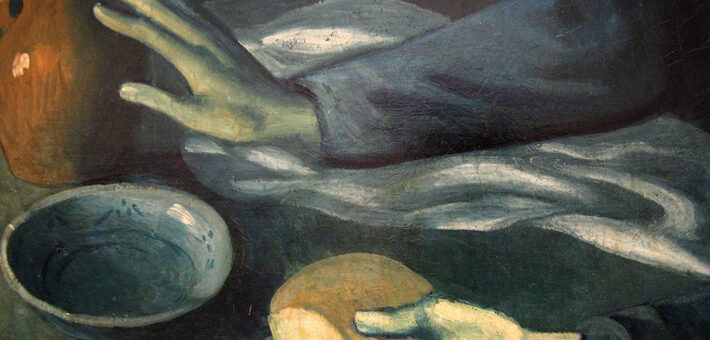Commentary on John 6:51-58
Jesus is manna, food that sustained Israel both physically and spiritually in the wilderness.
John 6:51 summarizes what Jesus has been saying since verse 32: “I am the living bread that came down from heaven, so that one may eat of it and not die.” The death of which Jesus speaks was the death that threated Israel under harsh conditions in the desert, and also the separation from God represented by the sentiment that life in Egypt was preferable (see Exodus 16:3). Manna was the solution God provided in that situation, and Jesus has been interpreting the scripture to identify himself as manna.
Jesus extends his interpretation in a new way in these verses. He indicates that the life he gives is “eternal”: “Whoever eats of this bread will live forever” (John 6:51). The phrase “live forever” (Greek: zesei eis ton aiona) is a variation of John’s more common words for the gift Jesus provides, eternal life (for example verse 54, zoe aionion). Throughout the Gospel, Jesus asserts that he is the bringer of eternal life for those who trust in him. The manna is already a story of God’s life-giving power. Jesus uses this opportunity to clarify that the life he brings as manna is this kind of life: it extends forever.
As is true elsewhere in the Gospel, this “life” Jesus brings is not limited to a future heavenly existence after death. Many modern Christians make this mistake in reading John’s Gospel. We are familiar with modern theological assertions that followers of Jesus go to heaven. In addition, the phrase “eternal life,” when used in the Synoptic Gospels, often refers to the resurrected life. For example, Matthew’s parable of the separation of sheep and goats after the coming of the Son of Man closes with the statement, “And these will go away into eternal punishment, but the righteous into eternal life” (Matthew 25:46). Matthew clearly has in mind a life that is “eternal” because it is distinct from temporally bounded human existence (compare with Mark 10:30).
John has something different in mind with the phrase “eternal life.” This life is available to believers in the present and not only in the future. Jesus says “those who eat my flesh and drink my blood have eternal life” (John 6:54) and “Very truly I tell you, whoever believes has eternal life” (John 6:47). The verbs are present tense. The life Jesus brings begins during the life of the believer and during Jesus’ own incarnate existence on earth.
In calling this life “eternal,” John communicates that the life Jesus offers is qualitatively different from regular human life. “Eternal” (or “forever”) is a characteristic that belongs only to the divine: “The Lord sits enthroned as king forever” (Psalm 29:10; Greek eis ton aiona); “The counsel of the Lord stands forever” (Psalm 32:11). It is God and God’s initiatives that properly possess this quality.
Those who trust in Jesus and “have eternal life” participate in this divine life even now. When Jesus later says, “I came that they might have life and have it abundantly” (John 10:10), he is saying something similar. Those who abide with him share in the creative force of the God who brought all things into being. This same life is embodied in Jesus (John 1:3-4).
John creates one contrast between Jesus and manna. The ancestors died in the wilderness, but those who eat of Jesus live forever (John 6:58). Modern readers should not see this as a rejection or criticism of the earlier bread God provided. The death of the first generation in the wilderness was not due to a defect in God’s manna, but resulted from the idolatry of Israel. Jesus offers his manna and suggests that the same apostasy will not result. “Those who eat my flesh and drink my blood abide in me, and I in them” (John 6:56). Those who eat are offered a union with Christ that endures.
Although the eucharistic meal is not explicitly mentioned here, readers are correct to identify these overtones. John’s Gospel is distinctive in that it has no moment of the institution of the Lord’s Supper (compare with Matthew 26:26-29). At Jesus’ last meal, the foot washing takes center stage (John 13:1-11). But these words in John 6 identify a future gift of eating and drinking Jesus’ flesh and blood, which certainly would have evoked the eucharist for early Christian readers.
These verses suggest that future meal is also a feeding on manna. Although the crowd introduced the manna story many verses ago, Jesus is still interpreting that quoted scripture, “he gave them bread from heaven to eat” (John 6:31). In fact, his words in verse 51 introduce a second interpretation. In verse 32, Jesus initiated his first interpretation, stating that the manna was not simply a gift of the past, but was present even now. Verse 51 does something similar, only now Jesus initiates a second interpretation of the scripture, “he gave them bread from heaven to eat.” He changes the subject “he” to “I,” so that Jesus himself is the giver of the bread. He also renders the verb in the perfect tense, “I will give.”
Collecting these statements in parallel may help the modern reader to see the relationship to verse 31. Here they are with the subject, verb, and direct object underlined:
He gave them bread from heaven to eat. (John 6:31)
My father gives you the true bread from heaven. (John 6:32)
The bread I will give for the life of the world is my flesh. (John 6:51)
By interpreting the scripture verse in these ways, John suggests that Jesus’ giving of his flesh and blood is a reiteration of the gift of bread from heaven. The future gift of bread, which Christian readers understand as the eucharist, is also manna.
This manna imagery is often discarded in modern celebrations of the eucharist in favor of sacrificial language. Drawing on John’s understanding eucharistic prayers might emphasize the story of God’s enduring care for Israel in the exodus story, and invite listeners to understand themselves as the recipients of this care. Those who receive Jesus’ body and blood might imagine themselves as those same wilderness travelers, following God in the pillar of cloud and fire, and feeding on manna, which was all that sustained them. John’s theological imagination opens up rich possibilities for growth in understanding of what it means to participate in this meal.


August 19, 2018